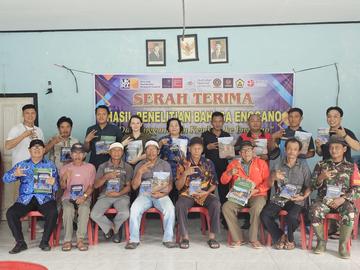Local community leaders on the island of Enggano, Sumatra, Indonesia have collaborated with a multinational research team to help mitigate the effects that result from younger speakers shifting from the endangered Enggano language to the national language, Indonesian.

End of project event where materials were presented to Enggano community elders and educators
Team members include
Professor Mary Dalrymple,
Dr. Charlotte Hemmings, and
Dr. Gede Rajeg, members of the Faculty of Linguistics, Philology and, Phonetics, as well as project members from the Australian National University; Goethe-Universität Frankfurt am Main in Germany; Udayana University in Bali, Indonesia; the University of Bengkulu in Bengkulu, Indonesia; and the Indonesian research organization BRIN.
Enggano is a traditionally oral language that is now only spoken by 1,500-1,600 people, and community leaders were concerned that the increasing use of the Indonesian language by younger people posed a significant threat of a serious loss of linguistic knowledge and cultural and linguistic diversity that would affect Enggano speakers, their local communities, and wider society. As with many endangered languages, there was an urgent need for documentation and materials to help support the language and revitalise the number of speakers. Researchers from the University of Oxford helped to produce this.
The research raised awareness of the potential for the Enggano language to be forgotten or lost over time, and made a positive impact that has helped these communities. It led to the production of resources that counteract language extinction such as audio-visual recordings that document conversations, stories, and traditional songs; an
online and
print dictionary that provide records of cultural and lexical resources; and
historical lexical databases that reveal language change.
The resources have been transcribed and translated into Indonesian and English which means that this important documentation is now widely available to the community and linguists. In the process of transcribing and analysing the corpus and designing teaching materials, the team collaborated with the community to
develop a writing system which can be widely used. Developing a writing system for a language is significant and is a key step that enables the creation of written resources in the language. It means that people can read and write in it, and also communicate digitally in an ever-increasing digital world.
The project deliverables included two textbooks that have been designed and published for use when teaching Enggano in
middle school and
high school, as part of the local language provision of the Indonesian curriculum. These were delivered to the community and the schools in Enggano during the recent end of project celebrations that took place in January 2025.
The project has stimulated interest amongst younger generations and provided them, and future generations, with sustainable access to their native language through the availability of recordings and the training of educators and community leaders. This research has further increased awareness of the importance of language diversity and the crisis of language endangerment worldwide.
The United Nations proclaimed 2022-2032 as the International Decade of Indigenous Languages. The initiative aims to draw global attention to the critical situation facing many indigenous languages, and to mobilize stakeholders and resources for their preservation, revitalization and promotion. The
Enggano project helps deliver upon the UN aims.
Researchers from the Faculty of Linguistics, Philology and Phonetics have also undertaken research to help other communities including some in
Northern Sarawak in Malaysian Borneo, Breton in France, and the Cofán people in the Ecuadorian and Colombian Amazon. Further information about projects relating to language documentation can be found on a
dedicated page on the Faculty site. Further work to help preserve endangered languages is planned for the future.